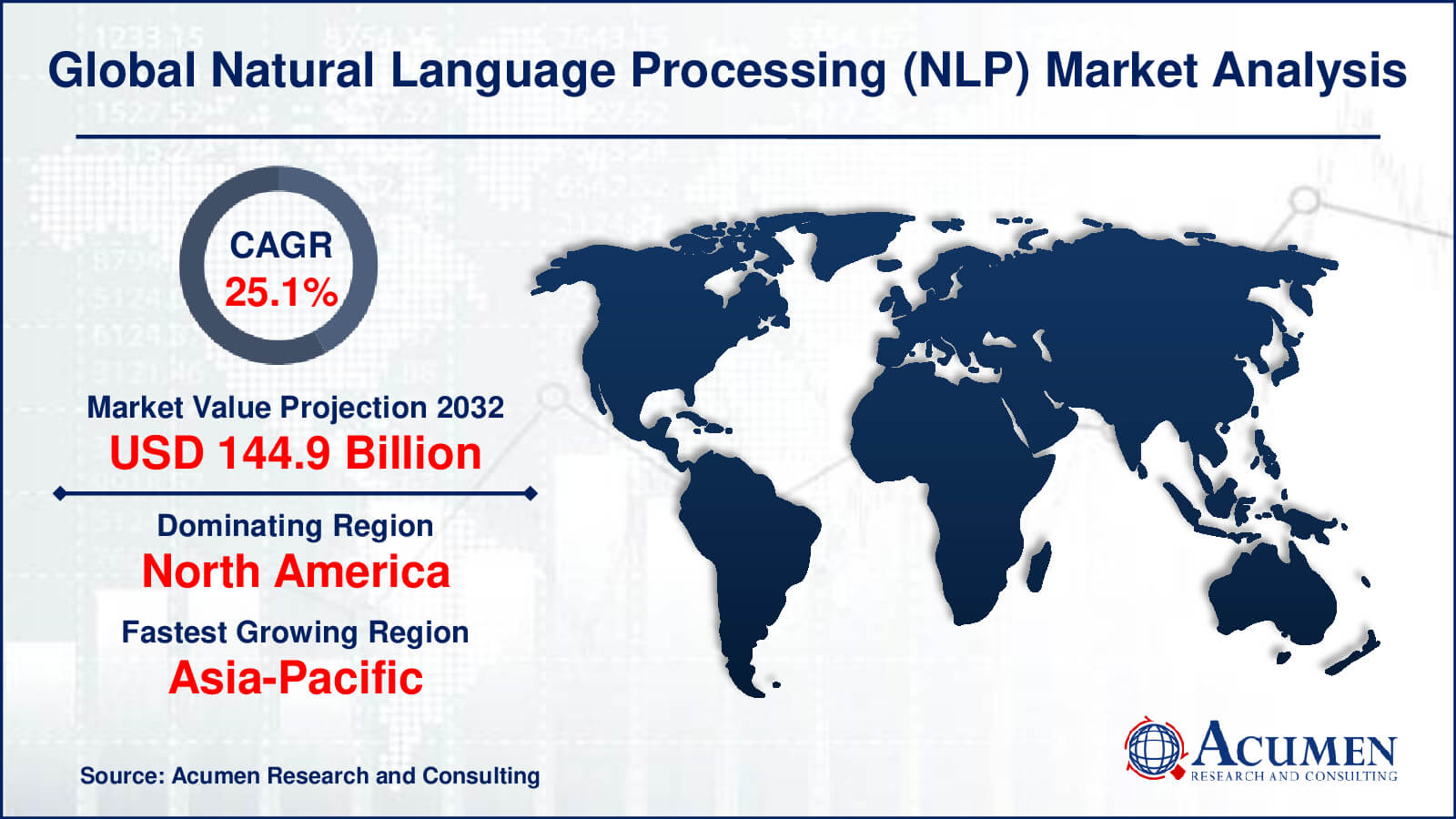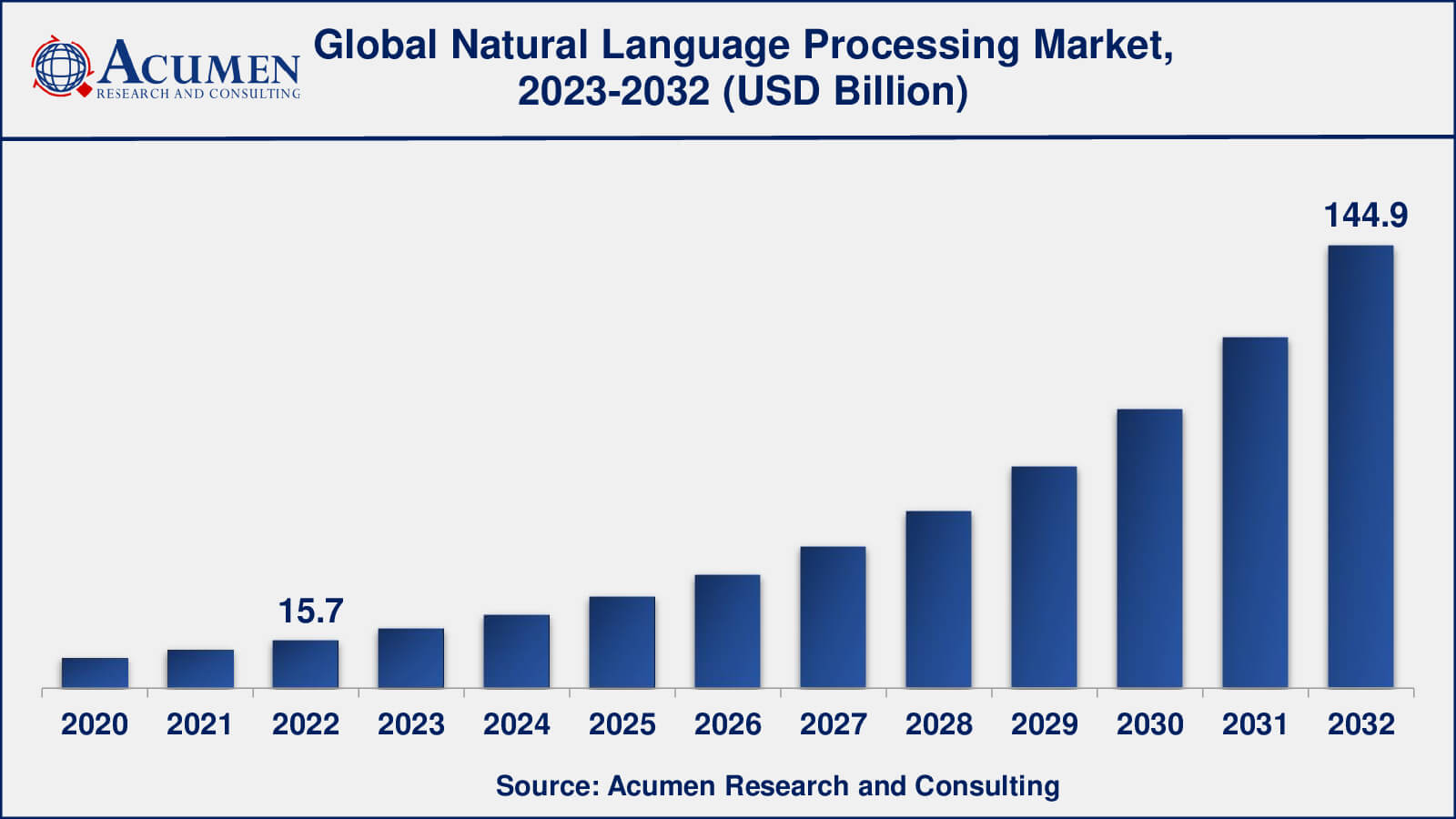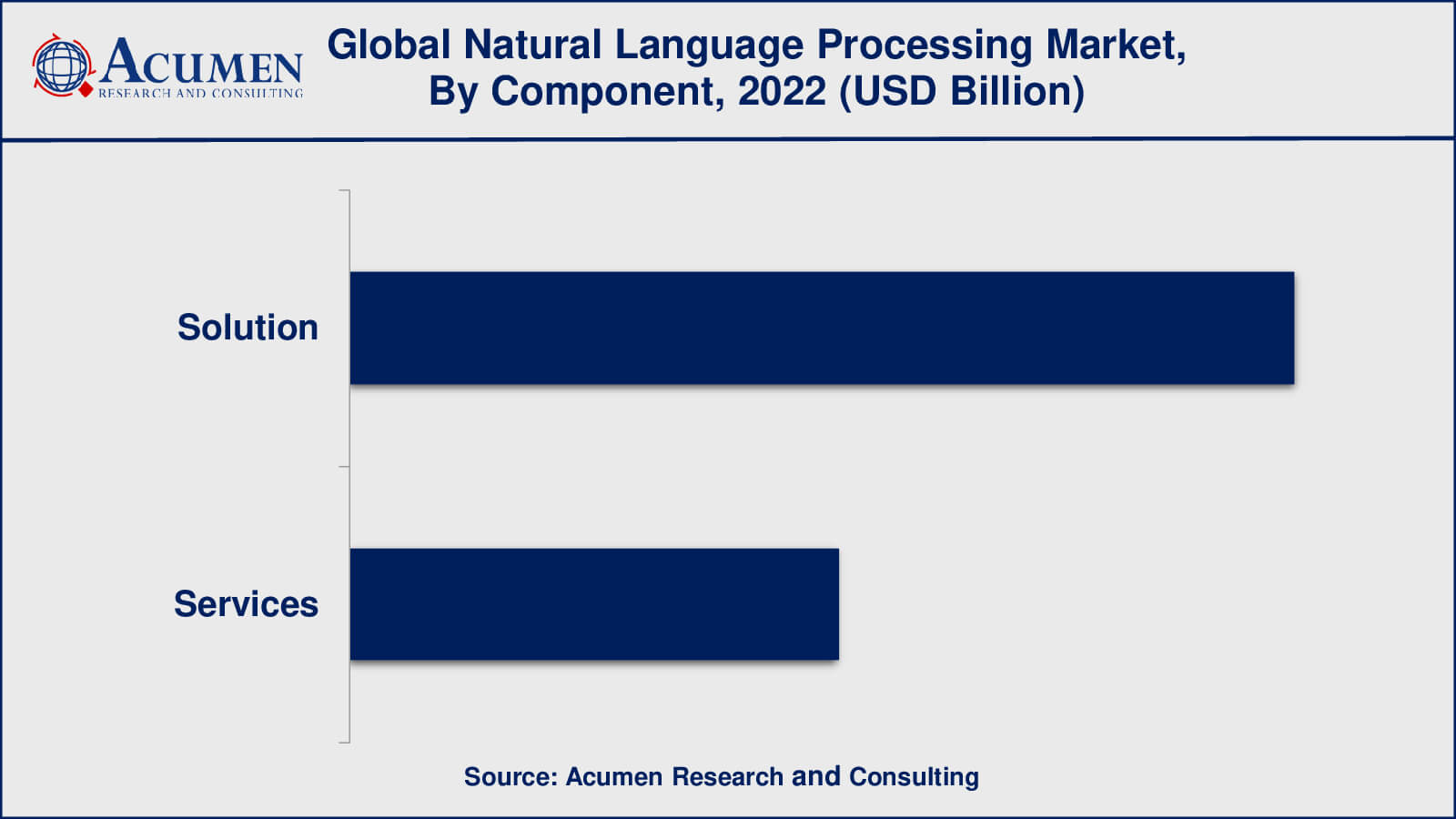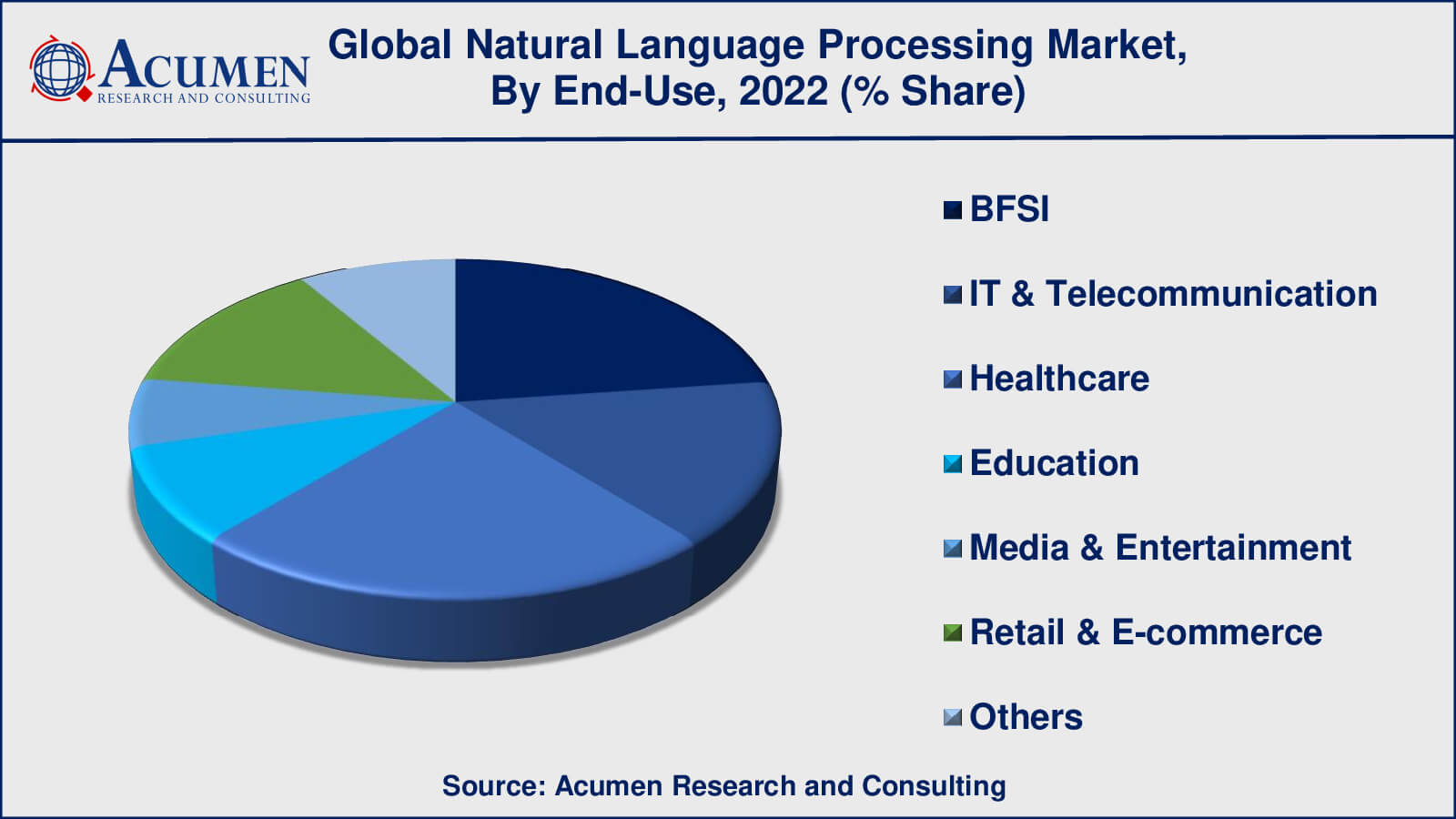Natural Language Processing Market Size - Global Industry, Share, Analysis, Trends and Forecast 2023 - 2032
Published :
Report ID:
Pages :
Format :
Natural Language Processing Market Size - Global Industry, Share, Analysis, Trends and Forecast 2023 - 2032
Report Coverage
- Industry Dynamics
- Market Size and Forecast Data
- Segment Analysis
- Competitive Landscape
- Regional Analysis with a Niche Focus on Country-Level Data
- High Level Analysis - Porter's, PESTEL, Value Chain, etc.
- Company Profiles of Key Players
- Option to Customize the Report As Per Your Specific Need
Request Sample Report
The Global Natural Language Processing (NLP) Market Size collected USD 15.7 Billion in 2022 and is set to achieve a market size of USD 144.9 Billion in 2032 growing at a CAGR of 25.1% from 2023 to 2032.
Natural Language Processing (NLP) Market Report Statistics
- Global natural language processing (NLP) market revenue is estimated to reach USD 144.9 billion by 2032 with a CAGR of 25.1% from 2023 to 2032
- North America natural language processing (NLP) market value occupied more than USD 4.7 billion in 2022
- Asia-Pacific natural language processing (NLP) market growth will record a CAGR of around 26% from 2023 to 2032
- Among component, the Cloud sub-segment generated more than 66% share in 2022
- Based on end-use, the Sentiment Analysis generated more than US $ 3.6 billion revenue in 2022
- Increasing demand for high-performance coatings is a popular Natural Language Processing (NLP) market trend that fuels the industry demand

NLP (Natural Language Processing) refers to a field of artificial intelligence (AI) and computer science which revolves around and is concerned with the interaction between human language and a machine. Natural language processing generally functions as a bridge between machines and humans. It improves interaction by analyzing spoken and written languages and the relative patterns associated with them. The main objective behind the development of natural language processing is to create a solution that can analyze, understand and generate languages that humans can easily understand. Such solutions are becoming significantly popular for organizations and enterprises which have big data to maintain. The global natural language processing market is a part of artificial intelligence which is capable of manipulating human language and converting it into machine language in a later stage.

Global Natural Language Processing NLP Market Dynamics
Market Drivers
- Increase in the volume of digital data
- Advancements in machine learning and AI
- Rise in demand for enhanced customer experience
Market Restraints
- Lack of accuracy and reliability
- Data privacy concerns
- High cost of implementation
Market Opportunities
- Growth in e-commerce and social media
- Increasing adoption of NLP in healthcare
Natural Language Processing (NLP) Market Report Coverage
| Market | Natural Language Processing (NLP) Market |
| Natural Language Processing (NLP) Market Size 2022 | USD 15.7 Billion |
| Natural Language Processing (NLP) Market Forecast 2032 | USD 144.9 Billion |
| Natural Language Processing (NLP) Market CAGR During 2023 - 2032 | 25.1% |
| Natural Language Processing (NLP) Market Analysis Period | 2020 - 2032 |
| Natural Language Processing (NLP) Market Base Year | 2022 |
| Natural Language Processing (NLP) Market Forecast Data | 2023 - 2032 |
| Segments Covered | By Component, By Deployment, By Type, By Application, By Enterprise Size, By End-Use, And By Geography |
| Regional Scope | North America, Europe, Asia Pacific, Latin America, and Middle East & Africa |
| Key Companies Profiled | Google Inc., Apple Inc., IBM Corp., Baidu, Hewlett-Packard Co, 3M Co., Microsoft Corp., IQVIA, Netbase Solutions Inc., Oracle Inc., SAS Institute Inc., and Dolbey System, Inc. |
| Report Coverage |
Market Trends, Drivers, Restraints, Competitive Analysis, Player Profiling, Covid-19 Analysis, Regulation Analysis |
Natural Language Processing (NLP) Market Growth Factors
The global natural language processing market is in an extremely profitable stage, especially for natural language processing software-based service providers and solution vendors. This is because of the increasing number of organizations and business firms working in a large number of domains and diverse verticals across the globe which are rapidly adopting natural language processing solutions for filling the communication gap between machines and humans. Rising demand for efficient improved and enhanced consumer experience around the world is uplifting to encourage end-user industries to increase their overall investments in natural language processing services and solutions which in turn is a key factor fueling the growth of the global natural language processing market over the forecast period. Moreover, the rising adoption of natural language programming in customer care processing organizations as well as a reduction in initial and operation costs is considered to be some of the key aspects anticipated to boost the growth of the global natural language processing market. In addition, improved insights into consumer perception as well as optimized business processes coupled with easy machine-to-machine technology can be easily derived by using natural processing language.
Natural Language Processing (NLP) Market Segmentation
The worldwide natural language processing market is categorized based on component, deployment, type, application, enterprise size, end-use, and geography.
Natural Language Processing (NLP) Market By Component
- Solution
- Services

According to the natural language processing (NLP) market forecast, the NLP solution segment will dominate the market in terms of revenue. NLP solutions are software applications, platforms, and tool that process and analyse natural language data using NLP algorithms. Chatbots, speech recognition systems, sentiment analysis tools, and language translation software are some of the solutions available. NLP services, on the other hand, refer to the professional services provided by NLP vendors and service providers. These services include NLP solution consulting, training, support, and maintenance. The NLP solution segment is expected to have a larger market share than the services segment. This is due to the growing demand for NLP solutions in a variety of industries, including healthcare, e-commerce, and finance. Businesses and organizations are turning to NLP solutions to gain insights, improve decision-making, and improve customer experience as the volume of unstructured data grows.
Natural Language Processing (NLP) Market By Deployment
- Cloud
- On-Premises
The cloud-based deployment model controlled the natural language processing market in 2022 and is expected to do so for the foreseeable future. The hosting of NLP solutions on cloud platforms such as Amazon Web Services (AWS), Microsoft Azure, and Google Cloud is referred to as cloud-based deployment. Cloud-based NLP solutions are typically delivered as Software-as-a-Service (SaaS) products and can be accessed via the internet. Cloud-based NLP solutions are scalable, allowing businesses to tailor their use of NLP solutions to their specific requirements. They also provide flexibility, as businesses can access NLP solutions from any location with an internet connection. In addition, cloud-based NLP solutions are frequently less expensive to implement than on-premises solutions, which makes them more affordable to small and medium-sized businesses. On-premises deployment, on the other hand, entails installing NLP solutions on local servers or data centers. On-premises NLP solutions necessitate the installation and maintenance of hardware and software, as well as the availability of dedicated IT personnel.
Natural Language Processing (NLP) Market By Type
- Statistical NLP
- Rule Based NLP
- Hybrid NLP
The statistical NLP approach occupied the natural language processing market in 2022 and is expected to do so in the future. This is due to its ability to handle large amounts of unstructured data, as well as its scalability and adaptability to different languages and domains. Statistical NLP analyses natural language data using statistical models and machine learning algorithms. This method entails training models on large amounts of data in order to identify patterns and relationships, and then applying those models to process and analyze new data. Rule-based NLP, on the other hand, analyses natural language data using a set of predefined rules and linguistic patterns. This method entails creating rules and patterns that capture the meaning and structure of language, then using those rules to process and analyze new data.
Natural Language Processing (NLP) Market By Application
- Sentiment Analysis
- Data Extraction
- Risk And Threat Detection
- Automatic Summarization
- Content Management
- Language Scoring
- Others (Portfolio Monitoring, HR & Recruiting, And Branding & Advertising)
Among application, the sentiment analysis is likely to account for utmost market share from 2022 to 2030. The process of identifying as well as extracting opinions, emotions, and attitudes from text data is known as sentiment analysis. It's used for things like customer feedback analysis, social media monitoring, and brand reputation management. The report attributes sentiment analysis's dominance to the growing demand for customer insights as well as the growing volume of unstructured data generated by online reviews, social media, and other sources. Businesses and organizations can use NLP to quickly and accurately analyze large amounts of text data in order to gain insights into customer sentiment and preferences.
Natural Language Processing (NLP) Market By Enterprise Size
- Large Enterprises
- Small & Medium Enterprises
Large enterprises dominated the NLP market in 2020 and are expected to do so in the coming years. Large enterprises have the resources and expertise to more easily adopt and implement NLP solutions than SMEs, and they are also more likely to have a greater volume of data to process and analyze. According to the report, large enterprises have a higher adoption rate of NLP solutions, larger budgets for technology investments, and a need for advanced NLP solutions to support complex operations and procedures. However, the report predicts that the SME segment will grow significantly in the coming years as more small and mid-sized businesses recognize the value of NLP in improving productivity, efficiency, and customer experience. As NLP solutions become more accessible and affordable, SMEs will be more likely to adopt them in order to remain competitive in their respective markets.
Natural Language Processing (NLP) Market By End-Use
- BFSI
- IT & Telecommunication
- Healthcare
- Education
- Media & Entertainment
- Retail & E-commerce
- Others

The BFSI sector dominated the NLP market in 2022 and is expected to do so in the future. The financial services industry was an early adopter of NLP technologies, using them to improve fraud detection, customer experience, risk management, and compliance. According to the report, BFSI's dominance is due to a number of factors, including the increasing volume of unstructured data collected by financial transactions, the need for real-time data analysis, and the growing demand for personalized customer service. BFSI firms can use NLP to quickly and accurately analyze large amounts of text data in order to gain insights into customer behavior and preferences, detect fraudulent activities, and mitigate risks.
Natural Language Processing (NLP) Market Regional Outlook
North America
- U.S.
- Canada
Europe
- U.K.
- Germany
- France
- Spain
- Rest of Europe
Asia-Pacific
- India
- Japan
- China
- Australia
- South Korea
- Rest of Asia-Pacific
Latin America
- Brazil
- Mexico
- Rest of Latin America
The Middle East & Africa
- South Africa
- GCC Countries
- Rest of the Middle East & Africa (ME&A)
Natural Language Processing Market Regional Analysis
North America held the largest share of the NLP market in 2022, and the region's dominance is expected to continue in the coming years. The region has an advanced IT infrastructure as well as a large number of established NLP solution providers. The growing demand for NLP solutions in industries such as BFSI, healthcare, and retail & e-commerce is projected to fuel the development of the North American NLP market.
Europe is the second-largest NLP market, owing to the increasing adoption of NLP solutions in industries such as healthcare, education, and media & entertainment. The region has a highly educated population and a strong emphasis on R&D, which has resulted in the development of advanced NLP technologies.
The Asia-Pacific region is expected to grow at the fastest rate in the coming years, owing to increased adoption of NLP solutions in countries such as China, Japan, and India. The region has a huge population and a rapidly expanding digital economy, which drives demand for NLP solutions across multiple industries.
Natural Language Processing (NLP) Market Players
Major players operating in the global natural language processing market are focusing on some key market strategies such as mergers and acquisitions to keep hold in the ever-competitive market. Moreover, they are concentrating on collaborating with local players to increase their market reach as well as strengthen their goodwill in the global market. Some of the global natural language processing (NLP) companies profiled in the report include Google Inc., Apple Inc., IBM Corp., Baidu, Hewlett-Packard Co, 3M Co., Microsoft Corp., IQVIA, Netbase Solutions Inc., Oracle Inc., SAS Institute Inc., and Dolbey System, Inc.
Frequently Asked Questions
What was the market size of the global natural language processing (NLP) in 2022?
The market size of natural language processing (NLP) was USD 15.7 Billion in 2022.
What is the CAGR of the global natural language processing (NLP) market during forecast period of 2023 to 2032?
The CAGR of natural language processing (NLP) market is 25.1% during the analysis period of 2023 to 2032.
Which are the key players operating in the market?
The key players operating in the global market are include Google Inc., Apple Inc., IBM Corp., Baidu, Hewlett-Packard Co, 3M Co., Microsoft Corp., IQVIA, Netbase Solutions Inc., Oracle Inc., SAS Institute Inc., and Dolbey System, Inc.
Which region held the dominating position in the global natural language processing (NLP) market?
North America held the dominating position in natural language processing (NLP) market during the analysis period of 2023 to 2032.
Which region registered the fastest growing CAGR for the forecast period of 2023 to 2032?
Asia-Pacific region exhibited fastest growing CAGR for natural language processing (NLP) market during the analysis period of 2023 to 2032.
What are the current trends and dynamics in the global natural language processing (NLP) market?
The current trends and dynamics in the natural language processing (NLP) industry include increase in the volume of digital data, advancements in machine learning and AI, and rise in demand for enhanced customer experience.
Which component held the maximum share in 2022?
The solutions component held the maximum share of the natural language processing (NLP) market.



